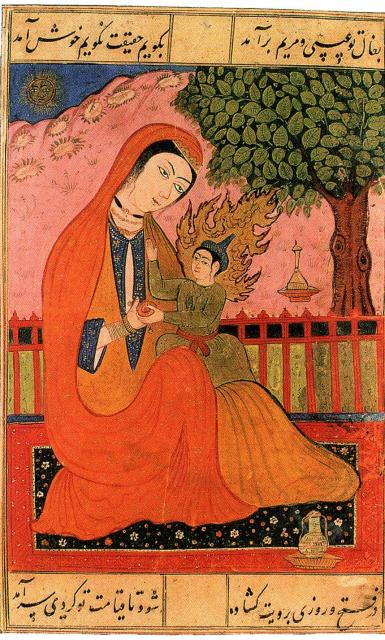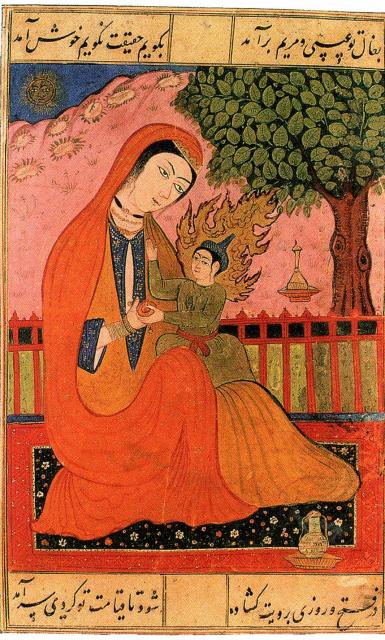Ann Arbor (Informed Comment) – The great medieval Muslim mystic and poet, Jalal al-Din Rumi (1207-1273), interpreted the birth of Jesus as an allegory of the soul. Rumi was born in Balkh in northern Afghanistan, but his family fled the Mongol invasions and settled in Konya in what is now Turkey. Rumi was a refugee child. Anatolia had been Byzantine territory and in Rumi’s time Konya still had a substantial Greek-speaking Christian population that celebrated Christmas all around him.
Both the Christian and the Muslim traditions honor Mary the mother of Jesus and it was natural that Rumi should think about the spiritual significance of the Nativity.
As I discussed last year, the Qur’an tells the story of the virgin birth in Chapter 19, entitled “Mary.”
The Chapter of Mary, 19:16-23, says (my interpretation):
And mention in the Book Mary, when she withdrew from her family to an eastern place.
And once remote from them, she hid behind a screen. Then we sent to her our spirit, who took the shape of a well-formed man.
She said, “I take refuge in the All-Merciful from you, if you are pious.”
He said, “I am but an angel of your lord, come to bestow on you a son without blemish.”
She said, “Will I have a son, when no mortal has touched me, and I was not rebellious?”
He said, “So it is.” He said, “Your Lord says, it is easy for me. We will make him a sign for the people and a mercy from us. The matter has already been decreed.”
So she bore him, and withdrew with him to a remote place.
And the pangs of childbirth drove her to the trunk of a palm tree. She said, “I wish I had died before now, and had been forgotten in oblivion.”
Rumi in chapter 5 of his Arabic treatise “In it What is In It,” translated by AJ Arberry as “Discourses of Rumi,” makes this mention of the pangs of childbirth his starting point for considering the spiritual message of this event. I will interpret from the original Arabic text.

Rumi says that pain is what drives human beings to undertake any task. As long as the pain associated with that endeavor, and passion for it, doesn’t fill their insides, people won’t strive to accomplish that object–whether it pertains to worldly success or salvation in the next world.
It was only, Rumi observes, when the painful contractions of childbirth began that Mary hugged the palm tree. (This imagery of the Qur’an about Mary and the pain of childbirth and the palm tree draws on Greek literary traditions that were still cultivated in the Near East, which can be seen in the myth of Leto giving birth on Delos to Apollo, as Suleiman A. Mourad has shown).
Now Rumi urges us to think about the story as an allegory of the soul. Mary, he says, is like the corporeal body, and each of us has a Jesus within us. When we experience pain, our Jesus is born. Without that excruciating torment, Jesus returns again to his essence by his secret path, and we remain deprived and lack any share in him.
Elsewhere in the Qur’an, in 3:47, when Mary asks the angel how she can give birth despite being a virgin, he replies that when God wills a thing to happen he simply says “Be!” and it is.
Rumi goes on to say that he has used words to draw out this allegory of each of our souls giving birth to our most realized selves (i.e. our Jesus) by working through a profound existential pain that we suffer.
He maintains, however, that a spiritually more advanced seeker will not need words and allegories to see this truth, but will read it in nature–in the heavens and the earth, since they themselves are the result of God’s command, “Be!” and it is.
Rumi’s notion that each human being has a Jesus within waiting to be born is not foreign to Christian mysticism.
Paul says (Gal.2: 20) “and it is no longer I who live, but it is Christ who lives in me.” In Cor. 2:16, Paul asks, ““For who has known the mind of the Lord so as to instruct him? But we have the mind of Christ (hēmeis de noun Christou echomen).”
Rumi and his son both wrote some mystical verse in Greek, showing that they knew the language well. Although it is obvious that much of Rumi’s thought is Neoplatonic, I’ve never seen anyone discuss the possible influences on him of Byzantine Neoplatonism. In any case, Rumi probably knew these verses of Paul.
So that is what Christmas means to some Sufi Muslims– it is a time to commemorate the pains that Mother Mary suffered and the birth of something wondrous, which emerges from working through the agony of the soul–the realized, perfected self, the Jesus within each of us.




 © 2026 All Rights Reserved
© 2026 All Rights Reserved